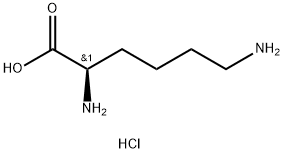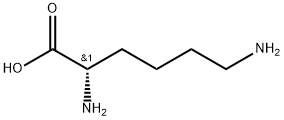H-D-Lys-OH·HCl , 98% , 7274-88-6
Synonym(s):
( R) -2,6-Diaminohexanoic acid monohydrochloride
CAS NO.:7274-88-6
Empirical Formula: C6H15ClN2O2
Molecular Weight: 182.65
MDL number: MFCD00012920
EINECS: 230-691-6
| Pack Size | Price | Stock | Quantity |
| 1G | RMB24.80 | In Stock |
|
| 5G | RMB56.80 | In Stock |
|
| 25G | RMB142.40 | In Stock |
|
| 100G | RMB455.20 | In Stock |
|
| others | Enquire |
PRODUCT Properties
| Melting point: | 266 °C (dec.)(lit.) |
| alpha | -21 º (c=8, 6N HCl) |
| storage temp. | Inert atmosphere,Room Temperature |
| solubility | H2O: soluble |
| form | Crystalline Powder |
| color | White |
| Water Solubility | SOLUBLE |
| BRN | 4356907 |
| InChIKey | BVHLGVCQOALMSV-NUBCRITNSA-N |
| CAS DataBase Reference | 7274-88-6(CAS DataBase Reference) |
| EPA Substance Registry System | D-Lysine monohydrochloride (7274-88-6) |
Description and Uses
D-lysine hydrochloride is the hydrochloride salt form of D-lysine. D-lysine is a kind of D-form amino acid (not the natural amino acid in organisms, which is in L-form). It is often supplied to animal feed. D-Lysine is used as a component of polymers (poly-D-lysine), surfactants and biofilms to confer a positive (cationic) charge. The poly-D-lysine can be used to facilitate the attachment of proteins and cells to solid surface through enhancing the electrostatic interaction between negatively-charged ion of the cell membrane and the positively-charged ions of the culture surface. In histochemical field, it is used to coat slides to promote cell attachment.
D-Lysine is used as a component of a wide array of polymers (poly-D-lysine), surfactants and biofilms to confer a positive (cationic) charge.




